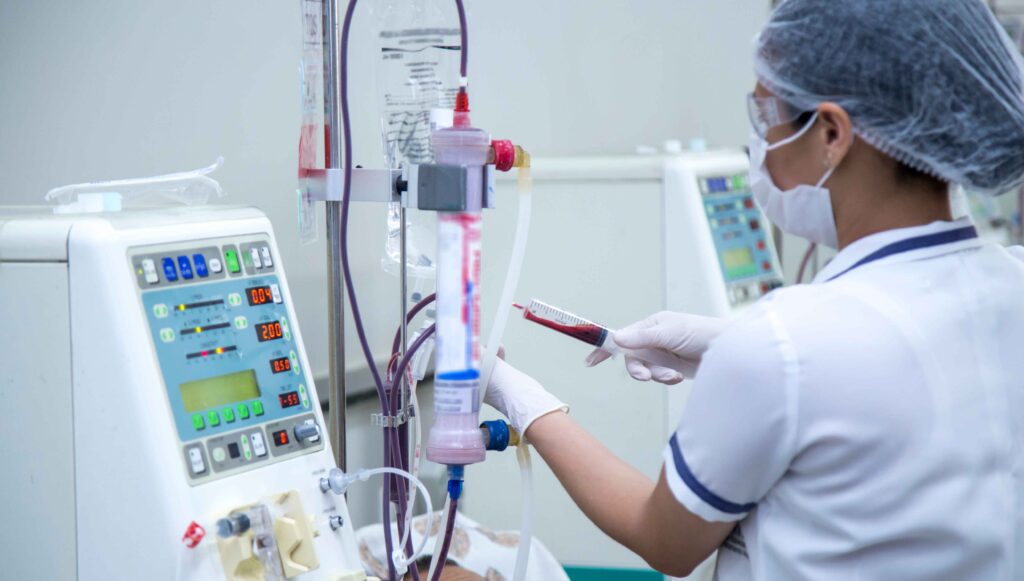If you are looking forWhy Is Protein So Important for People on Dialysis Care? Protein is essential for dialysis patients to rebuild muscle, repair tissue, and sustain vital proteins lost in blood during dialysis, since dialysis extracts some protein from the body. Yet, though a low-protein diet is generally reserved for initial kidney disease, dialysis patients need to consume more protein, but the precise amount needs to be individualized.
The Truth About Protein in Dialysis Care
On package labels, in exercise commercials, and in just about every conversation about wellness. But for visitors to dialysis, protein is more than a nutrition fad. It is the key to recovery, strength, and healthy long-term life. The body loses protein in every dialysis session, which makes daily consumption all the more vital. However, several visitors are unaware how crucial this is or how low protein levels can quietly impair energy, recovery, and overall well-being.
Why Protein Is Even More Important on Dialysis
On dialysis, though, your body does not only lose the toxins. It also loses a bit of protein every time.
That is, your body requires constant re-fuelling. If you do not have enough protein in your food, you might begin noticing:
- Persistent tiredness
- Slow healing of small cuts or procedures
- Increased frequency of infections
- Decreased muscle strength
- Thin hair or brittle nails
- In general, not consuming enough protein can quietly influence your quality of life and impede recovery.
How Much Protein Do You Need?
Dialysis patients usually need more protein than the rest of us. This is because their body is working overtime in order to heal itself when it is not having a dialysis session.
You always need to consult your dietician or nephrologist regarding any modification of your diet. They will provide you with proper foods, the amount of portions, and the amount of balance based on your report and target health.
Guest-Friendly Sources of Protein
The following are some protein-rich foods that are often suggested for dialysis care:
- Egg whites: Easy on the stomach and high in quality protein
- Moong dal: Light and easy to digest
- Paneer:Safe in small quantities
- Boiled or grilled chicken or fish: Lean animal protein sources
- Tofu and sattu: Good vegetarian choices
- Homemade curd: If allowed, aids gut health and protein intake
- Boiled chana or half portions of salt-free nuts: As recommended
When to Pay Attention
If you experience symptoms such as excessive fatigue, weak grip, weight loss, or delayed recovery following dialysis treatments, bring it up with your treatment team. These are possible early warning signs of low protein intake. Protein is more than mere food. To a guest undergoing dialysis, it is fuel for recovery, for growing strong, and for feeling well day by day. You may be confused regarding how much you require or what to consume.
Conclusion
Why Is Protein So Important for People on Dialysis Care?If you are looking For dialysis patients, protein is not only a macronutrient but a vital lifeline to healing, strength, and good health. Because dialysis is a cause of protein loss, daily needs need to be met through safe, individualized food choices under the direction of a nephrologist or dietitian to facilitate restoration and good health in the long term.
Frequently Asked Questions
Q. Why do dialysis patients need more protein?
Inadequate protein intake can cause muscle wasting, weakness, and a weakened immune system. Replacement of losses with high protein dietary intakes from high-quality protein foods, including meat, poultry, fish, and eggs, maintains overall well-being.
Q. Why is protein dialysis important?
Protein is necessary while undergoing dialysis to replace losses from the procedure, avoid muscle wasting and malnutrition, promote tissue repair and immunity, and ensure fluid balance.
Q. How does protein affect kidney function?
Protein’s impact on kidney function is based on general kidney health; in individuals with healthy kidneys, a high protein diet is not necessarily damaging but in individuals.
Q. What is the best protein for CKD patients?
Vegetarian proteins such as beans and nuts are less taxing on the kidneys than animal proteins such as meat and milk products.
Q. What is the link between protein and creatinine?
Thus increased intake of protein can cause an elevation in the serum levels of creatinine by increasing its production, but not its clearance.



